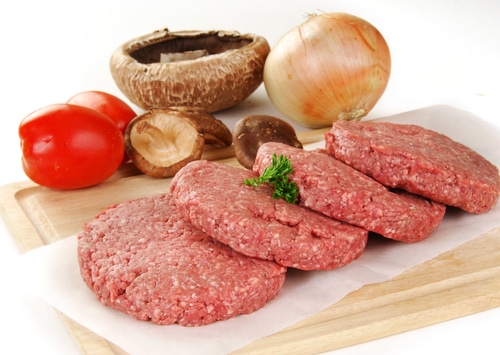
Organic Meat and Food Safety
It might seem that eating organic meat would reduce your risk of illness. After all, factory farms move meat through quickly on conveyor belts where there’s a greater risk for contamination. Plus, the animals were not fed high-quality food or given access to open fields. In general, they’re kept in living quarters that are less clean and they aren’t as healthy. On the other hand, research suggests that organic meat doesn’t necessarily offer greater protection against foodborne illness.
According to research published in Food Safety News, organic poultry had similar levels of bacteria called Campylobacter, a cause of foodborne illness, as conventionally-raised chicken and turkeys, although conventionally-raised ones had higher levels of bacteria that were resistant to antibiotics. So, eating organic poultry and organic meat, in general, probably won’t lower your risk for foodborne illness, although if you get infected the bacteria you’re infected with are more likely to respond to antibiotics. Nevertheless, you need to treat organic meat as carefully as conventional meat to protect you and your family against foodborne illness. Just as with conventional meat, you need to:
- Refrigerate meat right away. If you won’t be using it within two days, freeze it.
- Thoroughly wash and disinfect all utensils, boards, and surfaces that come into contact with uncooked meat before using them again and wash your hands.
- Heat meat to at least 140 degrees Fahrenheit before serving.
The Real Benefits of Organic Meat
Even though eating organic meat may not reduce your risk for foodborne illness, organic meat is still the better choice. When you buy certified organic meat, it hasn’t been exposed to growth hormones or antibiotics and the meat hasn’t been irradiated. Just as importantly, the animals ate organic feed and had access to the outdoors. They were probably raised on family farms where they were treated humanely and where environmentally-friendly farming practices were used. It’s a more humane choice for the animal and for the environment.
When you eat organic meat, you’re reducing your exposure to growth hormone and antibiotics. That’s a good thing. Not only does avoiding antibiotics in meat reduce antibiotic resistance, but there are also concerns that growth hormone in conventional meat and dairy products may increase the risk of some types of cancer like breast and prostate cancer. Non-organic meat producers give animals growth hormone to increase their size and weight. Plus, some research shows that grass-fed beef has higher levels of omega-3 fats, healthy fats that most people don’t get enough of.
The Bottom Line?
There’s no real evidence that eating organic meat will reduce your risk for foodborne illness, but it may be better for your health long-term because you’re not exposed to growth hormone and antibiotics every time you eat a piece of meat. It may be a bit more expensive, but you can feel good knowing the animal was treated humanely and wasn’t kept in cramped, unnatural quarters. When you choose organic meat, you’re also supporting smaller, family farms that don’t use mass production methods.
Organic meat may be a smarter choice for your overall health, but an even better option is to add more vegetarian protein sources to your diet. Good choices are tempeh, quinoa, lentils, nuts, and seeds. When you eat vegetarian protein sources, you’ll get more fiber and less saturated fat. That’s a good thing when it comes to your health. Diversify your diet by eating more vegetarian protein and when you buy meat, consider the benefits of choosing organic. Look for the USDA organic seal when you shop.
References:
USDA. “Foodborne Illness: What Consumers Need to Know”
Food Safety News. “Organic versus Conventional: A Bacterial Comparison”
Medical News Today. “Growth Hormone Could Promote Cancer, According To New Research, Australia”
Asia Pac J Clin Nutr. 2006;15(1):21-9.
Related Articles By Cathe:
Can You Trust that Organic Food is Actually Organic?
Explaining the Possible Link Between Processed Meats and Cancer
The Sometimes Confusing World of Meat Substitutes
Is Organic Food Better for You?
Natural Versus Organic: What Do They Mean and Are They Really Healthier?

